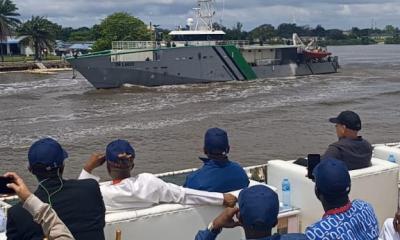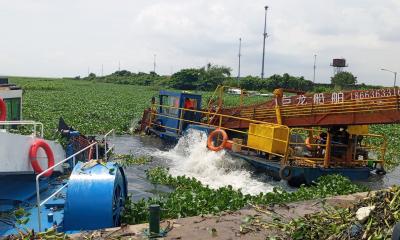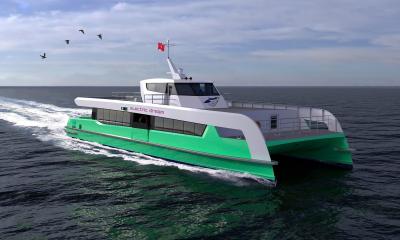Analyses
Nigerian Shippers’ Council: An economic regulator as hypocritical arbiter

“I’ll make sure that we re-engage the process in a way that will meet the needs and expectations of stakeholders in the industry.”
“I have personally discovered that our internal mechanism has not been properly implemented in order for us to arrive at the decision that we made.
Analyses
Dantsoho: Turning Eastern ports to beautiful bride among Shippers through infrastructural upgrade, focused leadership

Analyses
Nigeria Maritime media celebrates Adeniyi over his transformational leadership as Customs boss

Analyses
Maritime Labour’s selfish stand against Ports and Harbour Bill

The Eyewitness News Analysis
For nine years, maritime labour has fought against the passage of the Ports and Harbour Bill 2015.
Initiated in the eighth Assembly and sponsored by Senator Andy Uba of Anambra South Senatorial District in 2015, the bill, read for the first time on the floor of the National Assembly in 2016, seeks, among other things, the decentralization of ports operations by involving more private interests in ports operations.
The purpose is to open up the ports space for massive investments and attract private sector funds that would be used to build massive port infrastructure.
The bill, if allowed to be passed into law, will repeal the Nigerian Ports Authority (NPA) ACT 1955 as amended by Act CAP 126 LFN 2004 and establish Nigerian Ports and Harbour Authority.
The bill seeks to further consolidate the gains of the 2006 ports concession programme which ceded terminal operations functions of the NPA to the private interests.
However, the bill which enjoyed accelerated hearing on the floor of both the Senate and the House of Representatives, was stalled and got stuck at the ninth National Assembly where it had passed through the third and final reading and waiting to be passed to the House of Representatives for concurrence before its transmission to the President for his assent.
The maritime labour under the aegis of the Maritime Workers Union of Nigeria( MWUN) had mobilised its massive membership across the maritime space to stall the passage of the bill.
The major reason for its opposition, according to Comrade Adewale Adeyanju, the President-General of the Union, is the fear of job loss for the teeming members of the union.
The position of the Maritime Workers union is quite understandable and in tandem with the modus operandi of all labour unions.
No matter the nobility and credibility of the objectives of any public service reform, if it conflicts with the interests of the members, the labour unions will fight it.
In as much as we sympathise with the position of maritime labour on the issue of the Ports and Harbour bill, its position against the passage of this noble bill, is at best, selfish and self–serving.
The Union has not controverted the public benefits which the bill, when passed into law, will bring to the Port operations in the country.
Such benefits as attracting more private sector funds to develop the maritime industry and fix the decaying port infrastructure, thus making our ports more attractive and competitive globally.
Over the years, the government has been overwhelmed with the demands to fund public infrastructures, hence its attraction to concessions, collaborations and partnerships with private sectors in order to get their funds for the development of some critical public infrastructures.
The worsening economy in the country has further placed a huge burden on the government so much so that it has started to falter in some of its financial obligations to these public infrastructures.
Further borrowing will sink the economy into a deeper mess as the country still wallows in the anguish of repaying its humongous debts.
So private participation such as the one being sought by the Port and Harbor Bill will save the nation’s sea ports from further decay due to the inability of the government to fund such a huge commitment.
For many years, the Nigerian Ports Authority has been going cap in hands to the multi- national finance companies to seek $800 million needed to rehabilitate the dilapidated ports infrastructures at Apapa, Tin Can, Onne and Calabar ports, an amount the Federal government could not afford.
Many stakeholders fear that the terms for such loans may not be too favourable to Nigeria as the lenders, in order to hedge against any risks, may hold the NPA to ransom, thus mortgaging our ports to foreign interests.
But with the passage of the contended bill, private sector funds will be readily available to carry out such remedial works without necessarily mortgaging our ports to the imperialist multi-national Finance corporations.
The labour union should rise above its selfish and parochial interests and look at the larger picture of the more developed and efficient port system under deregulated port operations.
The same opposition the Labor put up against the port concession programme of 2006 because of fear of job loss.
Yes, the programme recorded some casualties just as similar reform exercises, but the end eventually justified the means.
As widely acknowledged by the stakeholders, port concession, which ceded terminal operations to private interests, has resulted to massive infrastructural rebirth at the Nigerian Ports.
Terminal operations have become highly efficient, fast and safe which has led to a quicker rate of turnaround time of vessels.
The concessionaires have injected massive funds for the infrastructural development of the terminals.
While the concession programme shipped out redundant labourers, those who survived the purge now earn fatter salaries with mouth-watering remunerations and fantastic welfare packages which was not the case during the pre-concession era.
We understand that there would be casualties just as in the port concession programme and other reforms exercises, but those who are left will enjoy the benefits of the reform.
We are not an advocate of job loss especially at this trying time of the economy when the unemployment market is congested but no surgery is carried out without pain.
No reform is without casualties but the end will certainly justify the means.
Rather than the labour union throw away the baby with the birth water and oppose the passage of the bill in its entirety, the leadership of the union led by the amiable and indefatigable Prince Adewale Adeyanju, should seek to sit with the government and find a common ground for mutual benefits.
No government would be as insensitive as to throw away its workers who have staked their lives and energies to build an entity without adequate compensation and reward.
Just as what happened during the negotiations over the workers’ fate at the concession exercise when the affected workers were given a soft landing, the labour Union could made a similar demand to give a soft landing for any casualty that may be recorded under the disputed bill.
But to outrightly ask the government to jettison the bill which the generality of stakeholders had described as a new dawn in the maritime industry would be the height of self-preservation and selfishness, thereby placing the interests of few persons over the general good of the industry.
We understand the frustration of Comrade Adewale Adeyanju and his team over their inability to access the Minister of Marine and Blue Economy, Adegboyega Oyetola yet, we advise the team should be more persistent and patient.
With patience and diplomacy, the Minister will grant them an audience.
The Union should desist from clothing its interests for opposing the bill in the garb of public interests as it sought to do when its leadership claimed that the bill will expose the port space to security risks, a claim that is not verifiable and an attempt to blackmail the government.
Comrade Adewale Adeyanju should not yield to the urge to disrupt port activities should the union not have its way over the bill as the industry has enjoyed an uncommon industrial peace and harmony since he ascended the leadership of the union, a feat that was largely attributed to his style of negotiation rooted in lobbying and dialogue.
-

 Headlines2 months ago
Headlines2 months agoNRC police tracks down mastermind of railway vandalism in Kaduna
-

 Headlines2 months ago
Headlines2 months agoDenmark, Nigeria seek new areas of collaboration on maritime development
-

 Headlines4 weeks ago
Headlines4 weeks agoEx-NIWA boss, Oyebamiji, emerges most media-friendly CEO in maritime industry
-

 Headlines3 months ago
Headlines3 months agoNigeria dazzles Dominguez, IMO scribe, with practical demonstration of deep blue assets capabilities.
-

 Headlines2 months ago
Headlines2 months agoWater Hyacinth: An imported invasive aquatic menace NIWA is determined to fight in Nigeria
-

 Headlines3 months ago
Headlines3 months agoLagos government deploys 78 high-capacity electric ferries to kick- start launch of Omi Eko project

